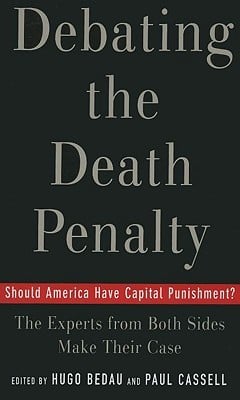This book was occasioned by former Illinois Gov. George Ryan’s blanket commutation of all death sentences imposed in his state to life imprisonment without parole. Philosopher Hugo Bedau and U.S. District Judge Paul Cassell have compiled a collection of outstanding point-counterpoint essays from leading members of the academic, legal, and political communities, discussing the validity of capital punishment in contemporary America. The arguments center on common themes: the utility of capital punishment as a deterrent; racial prejudice as a determining factor; incompetent defense for the poor; and due-process violations. For all of these issues, the data, both statistical and narrative, are quite contradictory—so much so that the reader, in moving from one essay to the next, is hard-pressed to formulate a confident opinion. This is hardly surprising, as the book reflects the ambivalence with which many people confront this emotional topic.
What is important, however, is that capital punishment is not portrayed by any contributor as, of itself, a metaphysical evil. There is inherent agreement among most of the authors that, if defects in the justice system could be ameliorated, if execution could be proved a deterrent to crime, and if there could be absolute surety of the guilt of the condemned, at least a philosophical justification might be established for the death penalty. Yet, for some, theoretical argument cannot justify practice, since civic and humane factors (they contend) may nullify its social value. Bedau’s argument that capital punishment overreaches is based on the principle of “minimal invasion,” which, he contends, allows government to go no further than what is necessary to achieve an important social goal. This position ignores the possibility that the state has an obligation to provide moral instruction or retributive justice. Another philosopher, Louis P. Pojman, advocates, on the other hand, that the use of capital punishment should be expanded from its present limited application in first-degree-murder cases to other instances, such as corporate scandals, where CEO’s and other executives have ruined the lives of countless employees and stockholders, thus destroying the basic trust on which democracy depends. Such an expansion, Pojman believes, would raise the moral consciousness of the citizenry.
It is doubtful that one can make a universal argument for or against capital punishment, as the historical data seem to ebb and crest according to circumstances. This leaves to the citizens of each jurisdiction the responsibility for deciding what is needed for their particular community. In my state of Michigan, for example, there is currently no death penalty; however, a recent spate of cop killings has brought about a public cry for a death-penalty measure to be placed on the 2006 ballot. According to some of the qualitative data, Cassell says, such laws make criminals think twice. The opening essay by U.S. Circuit Court of Appeals Judge Alex Kozinski is most clear on the importance of home rule. Although he thinks execution should be reserved for the “worst of the worst,” he argues that it is the role of the court strictly to interpret and enforce the law, which itself should reflect the will of the people as it is enshrined in each state’s penal code.
All of the authors agree that no evidence exists of an innocent person having been executed. Moreover, many convicts have been freed from death row solely on procedural grounds. Of this group, some convicted murderers have killed again following their release. Joshua Marquis, a district attorney who defends the death penalty, readily admits that any system for punishing criminals needs constant refinement to prevent errors. However, he warns, “that doesn’t mean we should throw out the baby with the bath water.” He effectively counters defense attorney Bryan Stevenson’s “race card” argument as outdated, while showing Stephen Bright’s “sleeping lawyer” argument to be a myth. Marquis holds that the federal trial and execution of Timothy McVeigh, as a punishment that clearly fit the crime while making a social statement regarding that crime’s particularly heinous nature, served as an effective model for a surer promotion of justice.
Even Pope John Paul II’s opposition to the death penalty is not absolute. One has to presume that the Pope is sensitive to the historical vagaries of the value and use of capital punishment. What may be justifiable in another time may not be in ours. Therefore, community standards, circumstances, and caution must be weighed in its application.
The book ends with Governor Ryan’s “I Must Act” speech, in which he announced the commutations. What is obvious in the context of the preceding essays is that Governor Ryan’s unilateral and blanket action was, in the end, a subversion of the will of the people, insensitive to the rule of law and to justice itself. Since capital punishment is such an important issue, the presentation of facts, cogent arguments, attentiveness to due process, and the will of the people are the only ways to build a consensus regarding how society should protect itself and the accused. This book may inspire better-considered decisions regarding the imposition of capital punishment, now and in the future.
[Debating the Death Penalty: Should America Have Capital Punishment? The Experts From Both Sides Make Their Case, by Hugo Bedau and Paul Cassell (New York: Oxford University Press) 234 pp., $26.00]

Leave a Reply